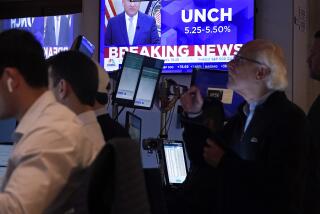In Global Rate Fight, U.S. Avoids the Pain
- Share via
In the midst of a horrendous new battle over currency values and interest rates in Europe, the view from American financial markets boils down to this: We win no matter what--so let somebody else take the bullet.
The “somebodies” in this case may turn out to be the poor Swedes, all 8.5 million of them. This week, in a desperate bid to force Germany to reconsider a high interest rate policy that is hurting all of Europe, Sweden raised its short-term interest rates from 16% to an astounding 75%.
Enough is enough, the Swedes are basically telling the Germans. Like most of Europe--and the world--Sweden is dead tired of Germany’s adamant posture on rates, which is to hold them up until the last bit of inflation is squeezed from Germany and perhaps all of Europe.
On Thursday, the interest-rate war spilled over to other countries. The Bank of Canada raised its key short-term lending rate to 5.14% from 4.93%, Italy boosted short rates to 15% from 13.25%, and the Mexico City stock market’s Bolsa index plummeted 40.19 points to 1,285.77, a new low for the year.
But on Wall Street, you’d never know a new crisis had overtaken foreign markets. The Dow Jones industrial average shot up 33.77 points to 3,305.16, and Treasury bond yields fell again.
In fact, that has been the pattern in financial markets all year, with few interruptions. U.S. interest rates have dropped sharply, and our stock prices have held up, while overseas rates have soared and foreign share values have plunged.
America has happily been odd-man-out in this global turmoil for one simple reason: We’ve refused to follow everyone else in matching high German interest rates, choosing instead to sacrifice the buying power of our currency.
It’s a choice we could make only because of the size of our economy and the dominant role the dollar still plays on the world financial stage. It’s also a choice we probably won’t be able to make again down the road, as our role wanes.
But for now, such bloody fights over global economic policy are forced on lesser countries such as Sweden.
As Germany has kept its interest rates up to slow economic growth and kill inflation, its European neighbors have been forced to keep their rates competitive or watch capital flee to Germany.
If you have an economy the size of the United States, you can afford to lose some capital. If you’re Sweden, you can’t. And it isn’t just money flows that count here: Most foreign nations are far more dependent on imports than we are.
If you devalue your currency, as the United States has, you raise the cost of imports. But if imports are a relatively small percentage of your gross domestic product, import inflation matters little. If on the other hand imports are a big share of GDP, you can’t afford devaluation because your overall inflation rate would soar.
Sweden, backed into that corner, decided to gut-punch the Germans by raising rates to a stunning 75%. Of course, that level of rates isn’t sustainable--they’d destroy the tiny Swedish economy in a hurry. What Sweden is doing is sending out a message that it hopes will be echoed soon by other European nations, says Byron Wien, investment strategist at Morgan Stanley & Co.
“Sweden is trying to encourage Germany to wake up and realize they’re precipitating the end of Western civilization with what they’re doing (keeping interest rates up),” Wien says, adding a dash of hyperbole for effect.
The Germans have argued that their interest rates are their business, and that nothing is more important than battling inflation--even if it means sinking the German economy into recession.
But by some accounts, Germany is already in recession. Many international economists argue that to keep German interest rates at current levels, let alone raise them further, is overkill.
Thanks to Sweden and whatever follows its desperation move, Wien believes that German resistance to interest-rate cuts is about to buckle.
Indeed, while some global market analysts suggest the European financial crisis could worsen depending on whether France votes for or against the European economic-unity treaty (Maastricht) on Sept. 20, many experts believe that the crisis is drawing to a close no matter how the French vote.
“I think a ‘no’ vote is already 70% to 80% discounted in the markets,” says Bill Wilby, manager of the Oppenheimer Global stock mutual fund in New York.
Whether France votes yes or no, many analysts believe that Germany’s reign as supreme capital magnet is drawing to a close--at least for now--because the German economy is wilting. As more investors join the camp that sees a decline in German interest rates as inevitable, there will be a new urgency to find better investment alternatives for 1993.
And because the United States has among the world’s lowest interest rates and perhaps the best shot at renewed economic growth next year, the natural conclusion should be that money will migrate back here--to catch not only the growth, but the rise in interest rates expected to accompany that growth.
“Two things are inevitable,” Wien says. “German rates will come down and the U.S. economy will recover.”
If that happens, we will have enjoyed the best of both worlds: We kept our interest rates low when other rates were high, and yet we managed to stay in position to attract new investment in a hurry when our economy finally turned.
The price, however, was the dollar’s value. For now, we’re still so big a factor in the world economy that we can play this game. But the message down the road is clear: The economic ascendancy of Japan, Germany and other nations means our days of having it all our way are numbered.
Import Dependence
One reason the U.S. can afford to allow its currency to slide is because spending on imports is a smaller share of U.S. GDP than most other major countries. The greater one’s import dependence, the greater the risk of import inflation if your currency slides.
1991 GDP Imports as Country (billions) pct. of GDP Germany $1,830 31.6% Britain $1,139 24.4% France $1,408 22.3% United States $5,678 10.9% Japan $3,683 8.5%
Imports include goods and services.
Source: First Interstate Bancorp
While Foreign Woes Mount, U.S. Markets Coast Along High interest rates abroad have slammed foreign stock markets and sliced the dollar’s purchasing power against many key currencies this year. Yet the U.S. stock market has remained strangely serene through the ordeal. U.S. Leads Major Markets . . . Performance of key stock market indexes, year-to-date: U.S. (S&P; 500): +0.7% France (CAC): +0.5% Germany (DAX): -3.1% Britain (FTSE): -6.1% Japan (Nikkei): -17.7% Italy (MIB): -25.7% . . . Despite the Dollar’s Drop Dollar’s decline against key foreign currencies year-to-date: Japanese yen: -1.1% British pound: -5.7% German mark: -6.6% French franc: -7.1% Swiss franc: -7.4%
More to Read
Inside the business of entertainment
The Wide Shot brings you news, analysis and insights on everything from streaming wars to production — and what it all means for the future.
You may occasionally receive promotional content from the Los Angeles Times.










